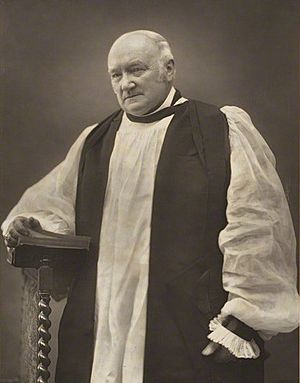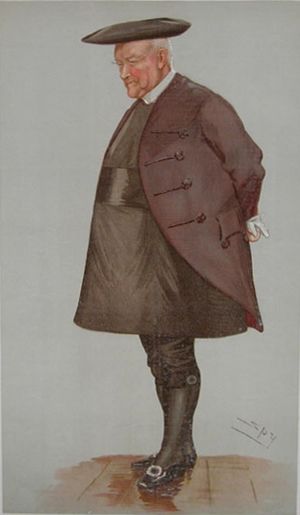William Alexander (bishop) facts for kids
Quick facts for kids William Alexander |
|
|---|---|
| Archbishop of Armagh Primate of All Ireland |
|
 |
|
| Church | Church of Ireland |
| Diocese | Armagh |
| Elected | 25 February 1896 |
| In Office | 1896–1911 |
| Predecessor | Robert Gregg |
| Successor | John Crozier |
| Orders | |
| Ordination | 1848 |
| Consecration | 6 October 1867 by Marcus Beresford |
| Personal details | |
| Born | 13 April 1824 Derry, Ireland |
| Died | 12 September 1911 (aged 87) Torquay, Devon, England |
| Buried | St Columb's Cathedral |
| Nationality | Irish |
| Denomination | Anglican |
| Parents | Robert Alexander, Dorothea McClintock |
| Spouse | Cecil Frances Alexander |
| Children | 4 |
| Previous post | Bishop of Derry and Raphoe (1867–1896) |
William Alexander (born April 13, 1824 – died September 12, 1911) was an important Irish church leader. He was a cleric in the Church of Ireland, which is a Christian church in Ireland.
Contents
Who Was William Alexander?
William Alexander was born in Derry, Ireland, on April 13, 1824. He was the third child of Robert Alexander, who was also a priest. William went to school at Tonbridge School and then studied at Brasenose College, Oxford University.
While at Oxford, he was influenced by the Oxford Movement. This was a group of people who wanted to bring back older Christian traditions into the Church of England. Even though he was sometimes ill, he was a very good student and learned a lot. This knowledge helped him throughout his life.
His Journey as a Church Leader
After finishing his studies, William Alexander worked in several church roles in Ireland. He was a rector (a type of priest) in places like Fahan and Camus-juxta-Mourne (Strabane). From 1864 to 1867, he was the Dean of Emly, which is another important church position.
In 1867, he became the Bishop of Derry and Raphoe. A bishop is a senior leader in the church who oversees a group of churches called a diocese. He was one of the last bishops from Ireland to be part of the House of Lords in the British Parliament. This changed when the Church of Ireland was separated from the government in 1871 by the Irish Church Act 1869.
In 1896, William Alexander was chosen to be the Archbishop of Armagh. This is the most senior leader in the Church of Ireland, also known as the Primate of All Ireland. He held this important role until 1911.
His Work and Writings
From 1871 to 1877, William Alexander played a big part in reorganizing the Church of Ireland. He helped make sure that the Irish Book of Common Prayer (a prayer book used in church services) stayed very similar to the one used in the Church of England. He was a strong voice for keeping traditions.
He was also a talented speaker and writer. He wrote many books about religion, including one called Primary Convictions. He was especially known for his beautiful poems. His poems were collected in a book called St Augustine's Holiday and other Poems in 1887. In 1876, he gave a series of important lectures called the Bampton Lectures.
His Family
William Alexander's wife was Cecil Frances Alexander. She was also a famous writer, especially known for writing many well-known hymns (church songs). Some of her most famous hymns include "Once in Royal David's City" and "All Things Bright and Beautiful".
William and Cecil lived in a house called Milltown House in Strabane, which is now a school called Strabane Grammar School. Their daughter, Eleanor Jane Alexander, also became a poet and novelist, following in her parents' footsteps.
Remembering William Alexander
After William Alexander passed away, people wanted to remember his contributions. In 1913, a beautiful stained glass window was put in his memory at St Columb's Cathedral in Derry. The window shows images of Moses, King David, and Isaiah. These figures represent his qualities as a leader, a poet, and a preacher.
At the bottom of the window, there are words from his resignation speech: "Not in wisdom of words, lest the Cross of Christ be made void." This means he believed that the message of Christianity was more important than fancy words. There is also a memorial for him at St Patrick's Cathedral, Armagh.
Images for kids



